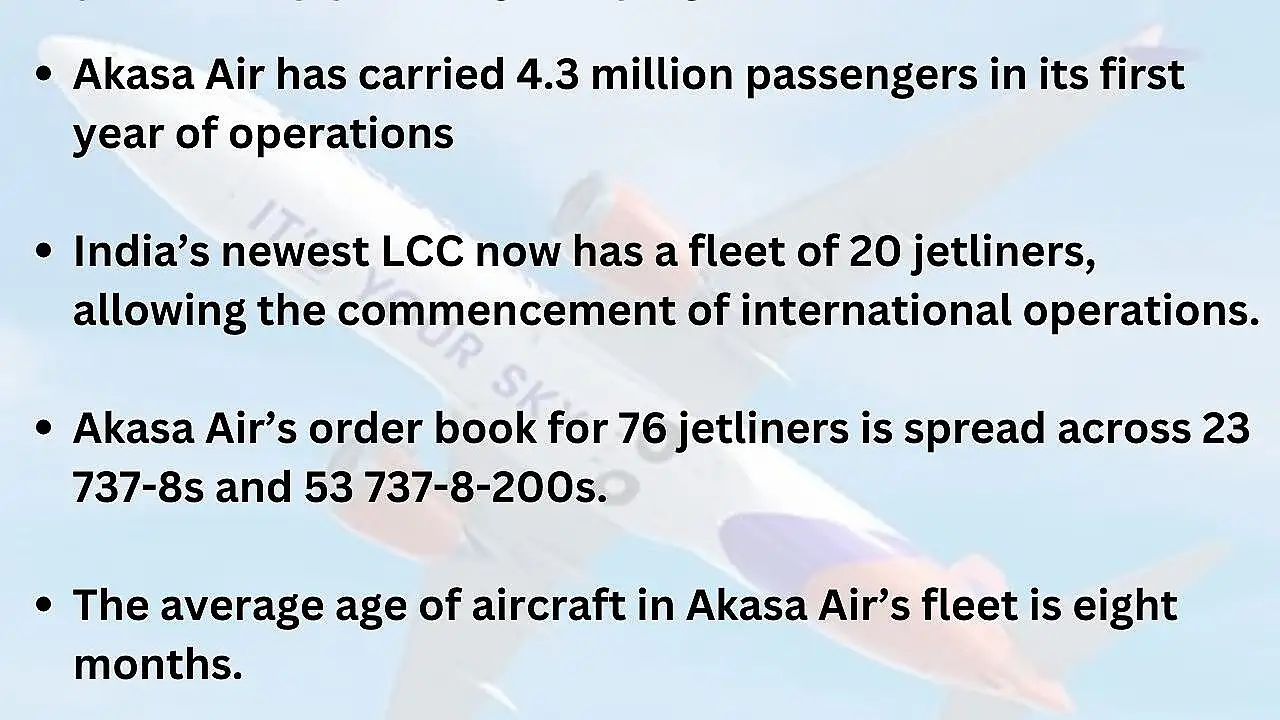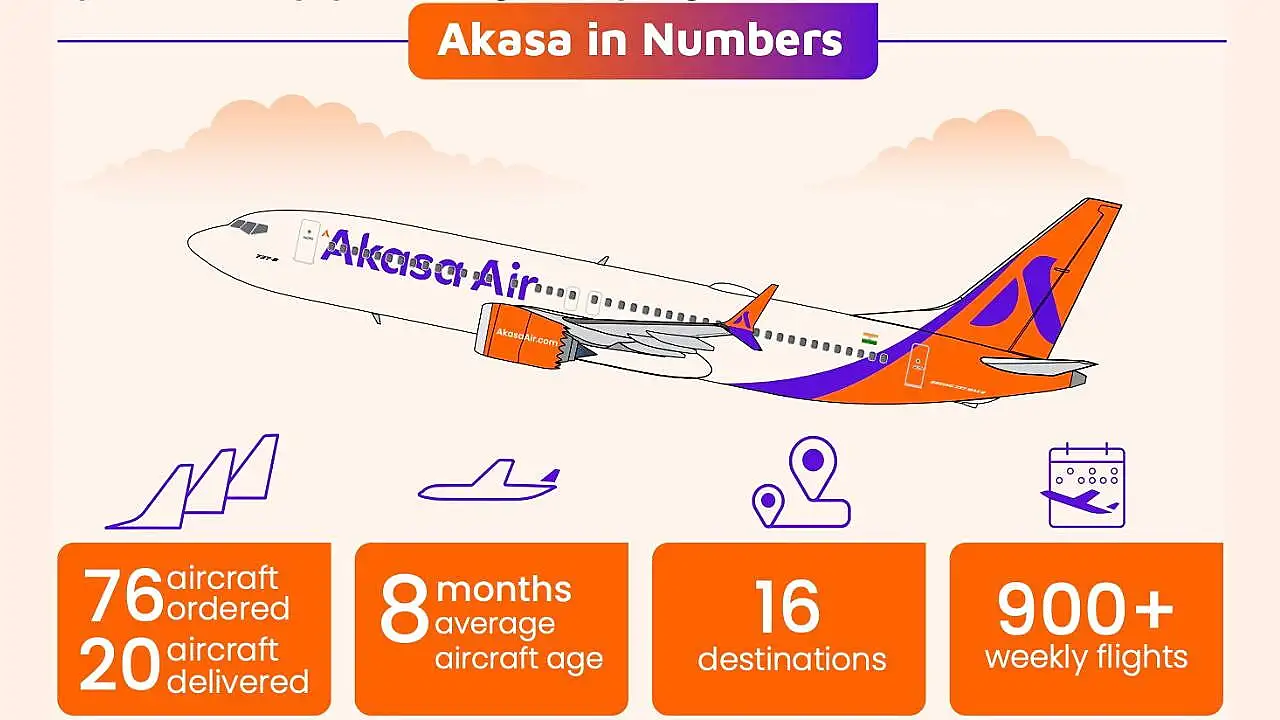
In August, Akasa Air completed one year of operations in India’s competitive civil aviation market. Led by Founder and CEO Vinay Dube, the airline has grown quickly, adding 20 Boeing 737 MAX jetliners to its fleet and is now looking to commence lucrative international operations by December 2023. As per Indian airline regulations, domestic carriers must have at least 20 aircraft in their fleet to become eligible for international operations.
Akasa Air also claims to be the first airline in the 120-year history of global aviation to reach a fleet size of 20 aircraft in less than a year of operations. Its fleet size is slated to rise to 28 by March 2024 and grow to 52 by 2027, as the carrier remains on track to place an order for at least another 100 aircraft by the end of the year.
India’s newest Low Cost Carrier (LCC) made its first commercial flight on 7 August 2022 and since then has carried more than 4.3 million passengers and 25,000 tonne of cargo. It now operates over 900 weekly flights across 35 routes to 16 destinations and carried its highest number of passengers of 21,528 on 2 July. In its first year of operations, Akasa Air has grown its market share to 4.9%, registering a passenger load factor of over 84%, which grew to nearly 90% in the current fiscal. It has also recorded the highest on-time performance for several consecutive months this year.
Max Trust
Operating an all 737 MAX fleet, the airline has emerged as an important customer for Boeing, which has had to cede second place to Airbus in the Indian single-aisle market. It announced its first order with Boeing in November 2021 by signing up for 72 units of 737 MAX jetliners worth nearly $9 billion. When placing the order, Dube had said that the Boeing jetliners would support Akasa Air’s aim of running not just a cost-efficient, reliable and affordable airline but also an environmentally friendly company with the youngest and greenest fleet in the Indian skies. The airline’s average fleet age now stands at eight months.

Once it started operations, the carrier added a brand new aircraft every fortnight, growing its fleet to 20 aircraft within the first year. It took delivery of its 20th aircraft, a 737-8-200 (registration VT YAV), on 1 August, becoming the first Asian carrier to induct the high-capacity variant. Compared to the older Boeing 737NG, the airline's CFM International LEAP-1B powered 737 MAX jetliners reduce fuel use and carbon emissions by at least 20% and offer 20% lower airframe maintenance costs, a vital part of airline operations. In June, it ordered four additional 737-8 jets at the Paris Air Show. Its order book with Boeing now stands at 76 aircraft, spread across 23 737-8s and 53 of the larger 737-8-200 jetliners. The larger 737-8-200 will be used to drive its international operations.
The airline has partnered with one of the global MRO leaders, AFI KLM E&M, for component services and dedicated Auxiliary Power Unit (APU) solutions from its subsidiary EPCOR. AFI KLM E&M capitalised upon its expertise on the B737 and its airline
MRO profile to proactively suggest ways to reduce costs and develop a competitive adapted offering to optimise the total cost of ownership and achieve high operational reliability.
AFI KLM E&M supplies the carrier with an adaptive package of flight-hour solutions, including repair services, access to a spare parts pool, a Main Base Kit (MBK), and dedicated logistical support. The agreement also covers engine Line Replaceable Units and the B737 MAX 8s APUs. EPCOR, AFI KLM E&M’s centre of excellence for APU maintenance, is undertaking the repair and maintenance of GTCP131-9B APUs fitted on 737 MAX, along with the provision of replacement units and Health Monitoring/Fleet Management assistance using PROGNOS for the APU platform, and engineering-as-a-service.
Employee First Approach
Akasa Air today has over 3,000 employees and expects to grow its employee strength to more than 3,500 by March 2024. Company officials say that the airline’s employee-centric culture has helped attract top talent from across the country and achieved one of the industry's lowest attrition rates. It has also focussed on gender parity as one of the key aspects of the company’s growth strategy; 1/3rd of the carrier’s executive committee and about 40% of the airline’s workforce are women.

The fast-growing LCC has also invested heavily in training, which has led to the setting up of several world-class learning academies in key cities across the country. The Akasa Air Learning Academy (AALA) in Gurugram was expanded in May, growing to 34,000 sq feet to train over 700 future-ready aviation professionals. It is also home to India’s only door trainer for Boeing 737 MAX jetliners. It recently installed a B737 – 8-200 Mid Exit Door Trainer. A door trainer enables cabin crew to practice normal and emergency situations in a realistic environment. In addition to training cabin crew in operating the aircraft doors during regular flight phase scenarios such as push back, taxi, cruise, descent and landing, they also provide practical training on using the Type I main door and Type III automatic over-wing exit during emergencies.
Green Credentials
Akasa Air has worked to burnish its green credentials as a carrier focusing on sustainability, as its jetliners are much more environmentally friendly than their predecessors.
The airline has consistently invested in recycled materials, which are used in crew uniforms and shoes, as well as eco-friendly packaging in the airline’s in-flight meal service. Its onboard meal services are delivered in recyclable meal boxes with biodegradable cutlery. It has also eschewed the aviation tradition of using ceremonial water canon salutes at airports for inaugural flights and route inaugurations, saving approximately 3,00,000 litres of water as of August.
Also Read: